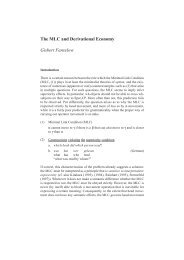Explaining language change: A three step process
Explaining language change: A three step process
Explaining language change: A three step process
You also want an ePaper? Increase the reach of your titles
YUMPU automatically turns print PDFs into web optimized ePapers that Google loves.
framework. It is generally assumed that it is possible to use the<br />
generative framework to analyze the grammar not only of one<br />
<strong>language</strong> but also the differences between the grammars of two<br />
or more (comparable) <strong>language</strong>s. Furthermore, <strong>language</strong> <strong>change</strong><br />
is also simply analyzed as a consequence of a new setting of a<br />
given parameter. However, we will show that the generative<br />
framework can only provide us with tools for the descriptive<br />
part, and that it does not give us an answer to the question of<br />
why the <strong>change</strong> really took place. Of course, this leads to the<br />
question of whether <strong>change</strong>s are necessary directly for systeminternal<br />
reasons, or whether some external (social) factors must<br />
always trigger the <strong>change</strong>. If so, how does <strong>language</strong> acquisition<br />
come into the picture? (Kroch 1989b: 201) claims that “When a<br />
<strong>language</strong> <strong>change</strong>s, it simply acquires a different grammar. The<br />
<strong>change</strong> from one grammar to another is necessarily<br />
instantaneous and its causes are necessarily external”. Weerman<br />
(1989) also emphasizes that visible <strong>change</strong>s in the <strong>language</strong> are<br />
necessarily caused by factors outside the grammar. Even in the<br />
case of external factors, acquisition is arguably very important<br />
for <strong>change</strong>. In the spirit of Longobardi (2001) we will argue that<br />
syntactic <strong>change</strong> is not primitive. In other words, syntactic<br />
<strong>change</strong> should not arise unless it can be shown to be caused,<br />
either as a consequence of other types of <strong>change</strong> (phonological/<br />
morphological), or other syntactic <strong>change</strong>s. Furthermore, we<br />
will argue that external factors may cause small <strong>change</strong>s in the<br />
E-<strong>language</strong> (PLD), and that this may lead to a major <strong>change</strong><br />
(grammar <strong>change</strong>) in the next generation’s I-<strong>language</strong>.<br />
There is also a fundamental question about linguistic <strong>change</strong><br />
that does not get posed very often; namely: How accurate is<br />
<strong>language</strong> learning in the ideal case of a monolingual community<br />
without outside contact? If it is very accurate, then all <strong>change</strong><br />
10

















